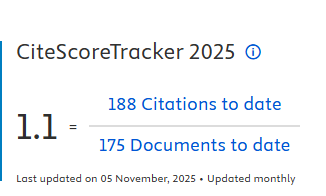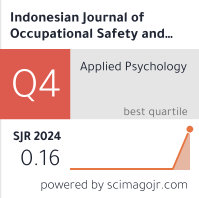Analysis of Factors Affecting the Behaviour of Medical Personnel in Carrying Out Hand Hygiene
Downloads
Introduction: The activities of health workers in carrying out their profession are very risky for nosocomial infections and very high infectious diseases . The Ministry of Health urges every medical personnel to carry out hand hygiene as an effort to minimize the occurrence of nosocomial infections. The purpose of this study was to determine the factors which affect the behaviour of medical personnel in carrying out hand hygiene protocols. Methods: This research was a correlational descriptive research. The population in this study were medical personnel of Kebonsari Public Health Center Surabaya, and the samples were taken using a simple random sampling technique with a total of 63 respondents. The variables in this study were knowledge, attitude, training, commitment, supervision and behaviour. Data collection was carried out using a questionnaire sheet, direct observation and statistical test using a path analysis. Results: The results of simultaneous statistical tests upon knowledge, attitude, training, commitment, and supervision showed that those 5 factors had an effect on hand hygiene behaviour with 45.6% coefficient of determination (R2), and the results of a partial statistical test (t test) on knowledge, training, commitment, and supervision showed a significant effect on hand hygiene behavior of < 0.05, while attitudes had no significant effect on hand hygiene behavior of > 0.05. Conclusion: Knowledge, training, commitment and supervision affected the behaviour of medical personnel in carrying out hand hygiene. These variables, theoretically, contribute to forming good behaviour.
Keywords: behavioral factors, hand hygiene, medical personnel
Ahmed, J. et al. (2020) ‘Compliance and Knowledge of Healthcare Workers Regarding Hand Hygiene and Use of Disinfectants: A Study Based in Karachi', Cureus, 12(2), pp. 1–10.
Amalia, R. et al. (2017) ‘Faktor-faktor Yang Berhubungan dengan Tingkat Kepatuhan Tenaga Kesehatan Melakukan Cuci Tangan (Studi Kasus di Instalasi Rawat Inap Rajawali RSUP Dr. Kariadi Semarang)', Junal Kesehatan Masyarakat, 4(3), pp. 1083–1088.
Anggara, P. M., Safitri, W. and Shovie, R. N. (2019) ‘Pengaruh Pelatihan Tentang Lima Moment Hand Hygiene Terhadap Pengetahuan Perawat dalam Pelaksanaan Standar Prosedur Operasional (SPO) di ruang Melati RSUD dr. Soehadi', Jurnal Kesehatan Masyarakat, 10(3), pp. 115–125.
Anggraeni, D. A. and Rahardja, E. (2018) ‘Pengaruh Gaya Kepemimpinan Feminin, Motivasi Kerja Dan Komitmen Organisasional Terhadap Kinerja Karyawan Pt Leo Agung Raya, Semarang', Diponegoro Journal of Management, 7(4), pp. 1–14.
Bird, J (1990) Practical Loss Control Leadership. Gergia: Loganville
Burhannudin, Zainul, M. and Harlie, M. (2019) ‘Pengaruh Disiplin Kerja, Lingkungan Kerja, dan Komitmen Organisasional terhadap Kinerja Karyawan: Studi pada Rumah Sakit Islam Banjarmasin', Jurnal Maksipreneur: Manajemen, Koperasi, dan Entrepreneurship, 8(2), p. 191-198.
Dreidi, M. M. et al. (2016) ‘Hand Hygiene Knowledge, Practices and Attitudes among Nurses and Physicians', Health, 08(05), pp. 456–462.
Ferdinah, R. (2017) ‘Gambaran Perilaku Hand Hygiene dan Determinannya Pada Perawat di Ruang Rawat Inap Gedung X Rumah Sakit Y Jakarta Tahun 2017', Jurnal Kesehatan Masyarakat, 87(1), pp. 149–200.
Graveto, J. M. G. do N. et al. (2018) ‘Hand Hygiene: Nurses' Adherence after Training', Revista Brasileira de Enfermagem, 71(3), pp. 1189–1193.
Hammerschmidt, J. and Manser, T. (2019) ‘Nurses' Knowledge, Behaviour and Compliance Concerning Hand Hygiene in Nursing Homes: A Cross-Sectional Mixed-Methods Study', BMC Health Services Research, 19(1), pp. 1–13.
Haque, M. (2020) ‘Handwashing in Averting Infectious Diseases: Relevance to COVID-19', Journal of Population Therapeutics and Clinical Pharmacology, 27(1), pp. 37–52.
Harmatiwi, D., Sumaryani, S. and Maria Rosa, E. (2017) ‘Evaluasi Pelaksanaan Supervisi Keperawatan di Rumah Sakit Umum Daerah Panembahan Senopati Bantul', Jurnal Medicoeticolegal dan Manajemen Rumah Sakit, 6(1), pp. 47–54.
Jonker, C. and Othman, M. (2018) ‘Hand Hygiene among Hospital Staff: A Survey of Knowledge, Attitude, and Practice in A General Hospital in Syria', Jurnal Keperawatan Indonesia, 21(3), pp. 139–149.
Malpiedi, P. J. et al. (2012) ‘2011 National and State Healthcare-Associated Infections Standardized Infection Ratio Report', CDC, 7, pp. 1–40.
Mangkuprawira, S (2014) Manajemen Sumber Daya Manusia Strategik. Bogor: Ghalia Indonesia
Mardikaningsih, R. and Maryana (2018) ‘Hygiene Di Ruang Rawat Inap Rumah Sakit Umum Daerah Depati Bahrin ( the Evaluation of Complience of Nurse Behavior in Carrying Out Hand Hygiene in Inpatient Room of Depati Bahrin District General Hospital', Jurnal Keperawatan Indonesia, 6(2), pp. 1–6.
McLaws, M. L. et al. (2015) ‘Iranian healthcare workers' perspective on hand hygiene: A qualitative study', Journal of Infection and Public Health, 8(1), pp. 72–79.
Minister of Health (2017) Pedoman Pencegahan Dan Pengendalian Infeksi di Fasilitas Pelayanan Kesehatan. Jakarta: Minister of Health.
Ni, L. et al. (2020) ‘An Interventional Implementation Project: Hand Hygiene Improvement', Annals of Translational Medicine, 8(18), pp. 1149–1149.
Notoadmojo, S (2014) Promosi Kesehatan dan Perilaku Kesehatan. Jakarta: Rineka Cipta
Nursalam (2018) Manajemen Keperawatan. Jakarta: Salemba Medika
Octaviani, E. and Fauzi, R. (2020) ‘Analisis Faktor yang Berhubungan dengan Kepatuhan Mencuci Tangan pada Tenaga Kesehatan di RS Hermina Galaxy Bekasi', Jurnal Kedokteran dan Kesehatan, 16(1), pp. 12–19.
Oh, H. S. (2019) ‘Knowledge, Perception, Performance, and Attitude Regarding Hand Hygiene and Related Factors among Infection Control Nurses in South Korea : A Cross-Sectional Study', American Journal of Infection Control, 47(January), pp. 258–263.
Pratama, B., Koeswo, M. and Rokhmad, K. (2015) ‘Faktor Determinan Kepatuhan Pelaksanaan Hand Hygiene pada Perawat IGD RSUD dr. Iskak Tulungagung', Jurnal Kedokteran Brawijaya, 28(2), pp. 195–199.
Purnawati, E., Junaiddin and Mewanglo (2018) ‘Faktor Yang Berhubungan Dengan Kepatuhan Pearawat Dalam Melakukan Hand Hygiene Five Moment di Ruang Rawat Inap RSUD Labuang Baji Makassar', Jurnal Ilmiah Kesehatan Diagnosis, 12(1), pp. 14–19..
Rahmadani, W., Mahmud, R. and Jafril (2020) ‘Pengaruh Supervisi Model Reflektif Interaktif Terhadap Perilaku Penerapan Kewaspadan Standar Perawat', Jurnal Endurane: Kajian Ilmiah Problema Kesehatan, 5(3), pp. 466–479.
Rahmawati, R. and Susanti, M. (2018) ‘Pengetahuan dan sikap perawat pencegahan infeksi nosokomial dalam pelaksanaan cuci tangan', Journals of Ners Community, 5(2), pp. 190–195.
Ratnawati, L. and Sianturi, S. (2018) ‘Faktor-faktor Yang Berhubungan Dengan Kepatuhan Perawat Dalam Menerapkan Hand Hygiene', Jurnal Ilmu Keperawatan dan Kebidanan, 9(2), pp. 148–154.
Shinde, M. and Mohite, V. (2014) ‘A Study to Assess Knowledge, Attitude and Practices of Five Moments of Hand Hygiene among Nursing Staff and Students at a Tertiary Care Hospital at Karad', International Journal of Science and Research (IJSR), 3(2), pp. 311–321.
Smiddy, M. P., O'Connell, R. and Creedon, S. A. (2015) ‘Systematic Qualitative Literature Review of Health Care Workers' Compliance with Hand Hygiene Guidelines', American Journal of Infection Control, 43(3), pp. 269–274.
Suma'mur (2014) Higiene Perusahaan dan Kesehatan Kerja (HIPERKES). Jakarta: Gunung Agung.
Supratman and Sudaryanto (2017) ‘Model-model Supervisi Keperawatan Klinik', Jurnal Berita Ilmu Keperawatan, 4(1), pp. 193-196.
Syamsulastri (2017) ‘Faktor yang berhubungan dengan Kepatuhan Perawat dalam Melakukan Hand Hygiene', Jurnal Kesehatan Masyarakat, 2(1), pp. 7–18.
Tacconelli, E. and Pezzani, M. D. (2019) ‘Public Health Burden of Antimicrobial Resistance in Europe', The Lancet Infectious Diseases, 19(1), pp. 4–6.
World Health Organization (2009) Hand Hygiene Knowledge Questionnaire for Health-Care Workers (revised August 2009). The World Health Organization.
Copyright (c) 2022 The Indonesian Journal Of Occupational Safety and Health

This work is licensed under a Creative Commons Attribution-NonCommercial-ShareAlike 4.0 International License.

In order to be accepted and published by The Indonesian Journal of Occupational Safety and Health, Author(s) who submit an article should complete all the review process. The copyright of received articles assigned to the The Indonesian Journal of Occupational Safety and Health and Department of Safety and Health, Universitas Airlangga as publishers of the journal. The intended copyright includes the rights to publish articles in various forms (including reprints).
The Editorial Team of The Indonesian Journal Of Occupational Safety and Health and Department of Safety and Health strive to ensure that no errors occur in the articles that have been published, both data errors and statements in the article.
Users of this website will be licensed to use materials from this website following the Creative Commons Attribution-NonCommercial-ShareAlike 4.0 International License. No fees charged. Please use the materials accordingly.
------------------------------------------------------------------------------------------------------------------------------------------------------------------------------------------
Attribution ” You must give appropriate credit, provide a link to the license, and indicate if changes were made. You may do so in any reasonable manner, but not in any way that suggests the licensor endorses you or your use.
NonCommercial ” You may not use the material for commercial purposes.
ShareAlike ” If you remix, transform, or build upon the material, you must distribute your contributions under the same license as the original.







 How to Submit Articles in OJS
How to Submit Articles in OJS

























